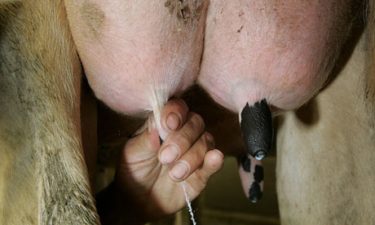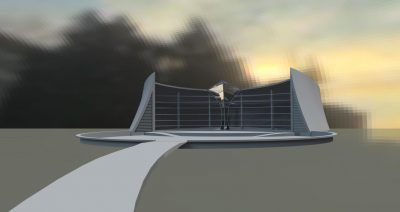 When caring for infants after any kind disaster breastfeeding is usually safest because of fears about water supplies.
When caring for infants after any kind disaster breastfeeding is usually safest because of fears about water supplies.Whenever there is an earthquake, flood or other large-scale disaster, the first concern is for the infants in the area. Rescue organizations rush to send infant formula to the area, but because access to clean water is usually limited the formula is useless. Continuing to breastfeed protects the baby from diseases that spread through a disaster area, and unnecessary weaning can cause problems if the supply of formula or clean water becomes unavailable. After Haiti, aid organizations are realizing that protecting the breastfeeding relationship and helping women return to breastfeeding (relactation) are the best means to save vulnerable infants.
Is breastfeeding also the best choice when the mother has high serum levels of radiation, which can pass to the infant through her milk? The disaster in Japan has raised awareness that all of us need to be prepared for nuclear disaster, including in the Middle East that has both operational and planned nuclear power plants that could be damaged by earthquakes.
Before deciding whether it’s preferable to breastfeed after exposure to nuclear radiation, it’s important to know the answers to the following questions:
- What is the level of the mother’s exposure to different types of radiation?
- Will breastfeeding raise the level of exposure in the baby?
- Are medications taken to reduce the effects of exposure, notable potassium iodide (KI), likely to pass through the mother’s milk to a degree that the baby could suffer from toxicity?
- Is there a safe, alternative food source for the baby? This generally means clean water and formula, or a supply of solid foods for an older baby. A good supply of water, needed both to mix with powder and to wash bottles, is often difficult to come by after a disaster. Both the powdered milk and the water would have been stored in a closed container to prevent exposure to radiation. A heat source might be needed to sterilize the water used to mix the formula.
Recommendations for Breastfeeding after Radiation Exposure
Neonatologist Kathleen Marinelli MD, IBCLC, FABM, a Board member of the Academy of Breastfeeding Medicine, and Chair of the ABM Protocol Committee goes into detail about the types of exposure and their effect on the lactating mother and nursing baby on the ABM blog.
Marinelli’s conclusions are based on recommendations by Dr. Ruth Lawrence, an expert both in toxicology and breastfeeding medicine:
- The greatest risk of exposure is to radioactive iodine, which gets into the thyroid and can lead to cancer. Exposure can be prevented with the appropriate dosage of potassium iodide (KI) for both the mother and baby. The mother should get one daily dose until she and the baby can be moved to a safe location. The baby should get only one direct dose of KI calculated to the baby’s weight, because a higher dose increases the baby’s risk of hypothyroidism. Babies’ thyroid function should be monitored to make sure they are not getting too much iodine from their mother’s milk.
- Infant are particularly vulnerable to radiation and should get priority, along with their mothers, for sheltering and evacuation.
- Up to 90% of external radiation exposure can be prevented by removing clothes and washing the skin with soap and water.
- If potassium iodide (KI) is not available, and a safe alternative food source is available, the baby should receive formula until the baby can be treated with KI to prevent contamination via the mother’s milk. Water in the area may also be contaminated with radiation, in which case there is no advantage to formula feeding and many disadvantages, including increased risk of infection.
Recommendations for exposure to radioactive iodine in a disaster situation are different from those when radioactive iodine is used in a diagnostic and therapeutic setting.
Potassium iodide saturates the thyroid and prevents further absorption of radioactive iodine, but won’t help remove radioactive iodine already present. Ideally, it should be administered prior to exposure or as soon afterward as possible, because it has little effect after 12 hours.
More posts on breastfeeding and the environment by Hannah Katsman:
Facebook Comments




Tinamarie, rereading the post, I see that I did include guidelines about keeping formula and bottles safe from radiation.
Veronica, thank you for the clarification.
Tinamarie, good idea! But sounds like you may be implying that when one talks about breastfeeding it’s important to give “equal time” to bottle-feeding. I believe that breastfeeding is a worthy subject on its own. Giving information about breastfeeding should not be seen as disparaging bottle-feeders in any way.
Hannah, thank you for this post.
I have one suggestion to make: the issue is not exposure to radiation, it is exposure to radioactivity. The difference is that you have to incorporate a radioiosotope (mostly iodine-131) in order for the breastfed baby to incur in any risk of exposure. This is called radioactivity. Radiation per se (as in external irradiation) does not pose any risk through breastfeeding.
Excellent information. Thanks Hannah. Just one question though – many mother’s don’t breastfeed. Are you planning to write guidelines for those families too? Just wondering…
Miriam, thank you for your informative comments. I heard you speak once many years ago and have always been a fan!
Dear All:
I fully agree with Kathie on these precautions and just wanted to add a few words about the reality of being in such a crisis.
First, of course take the potassium iodide to protect your thyroid. Second, consider the source of what you are putting in your baby’s mouth.
Cows eat grass, which is fully exposed to any ambient radiation, so cow’s milk is chock full. Water sits outside, so water is chock full. Conversely, human’s can choose what they eat. If you are able to continue to access radiation-free food, your milk will be MUCH less exposed than that from any external source.
If however, the food that you are eating is similar to grass, i.e., recently grown spinach, or from animals that have been out of doors, then your milk will be getting higher levels, but in the short run, DEFINITELY better than cows milk or water.
So, as this is an ever changing situation, let’s remain calm, recognize that human milk is much more than a replacement for formula, and try to reduce maternal exposures.